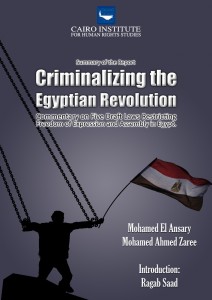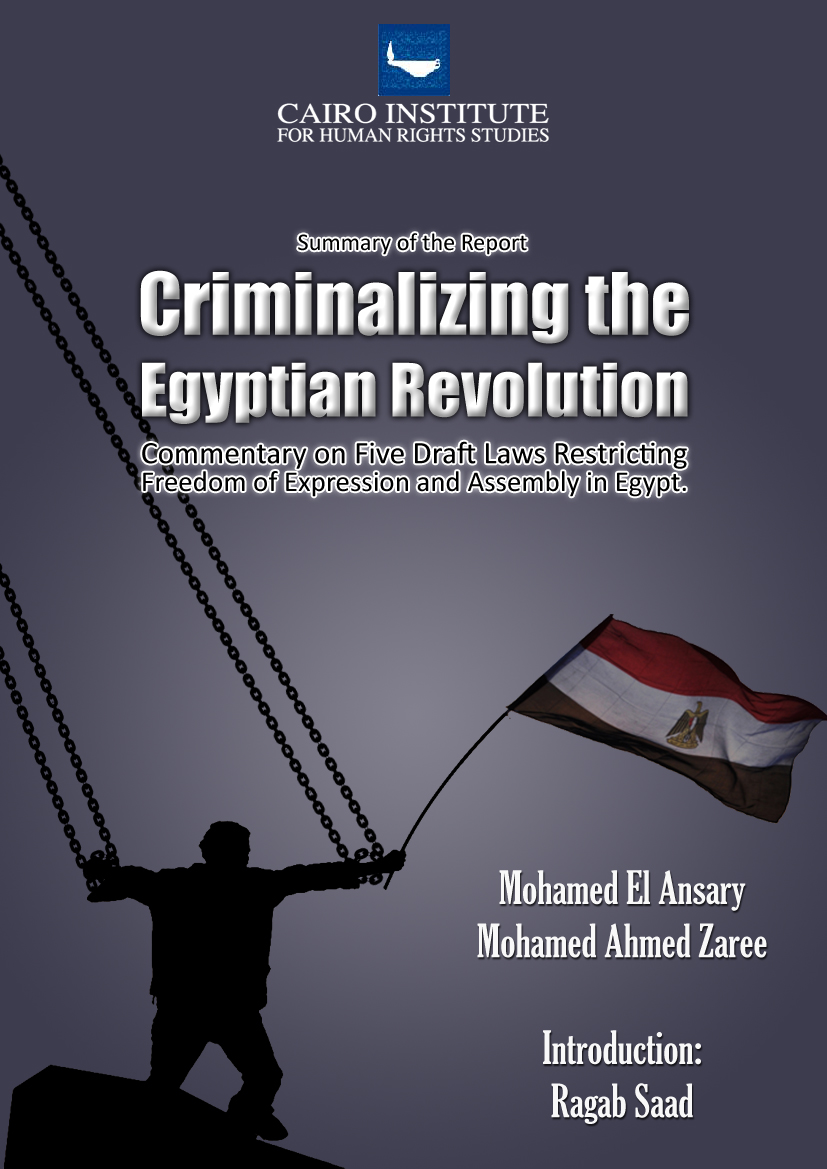 In the Mubarak era, a law restricting the press was drafted for the sake of a “free press” and a law repressing civil society was submitted in the name of “liberalizing civil society.” In the same vein, the Interior Ministry now claims that it is attempting to restore security and protect society with a new set of proposed laws, when in fact it is trying to undo much of the outcome of the January 25 revolution, restore the control of security forces over society, and retroactively criminalize the revolution itself.
In the Mubarak era, a law restricting the press was drafted for the sake of a “free press” and a law repressing civil society was submitted in the name of “liberalizing civil society.” In the same vein, the Interior Ministry now claims that it is attempting to restore security and protect society with a new set of proposed laws, when in fact it is trying to undo much of the outcome of the January 25 revolution, restore the control of security forces over society, and retroactively criminalize the revolution itself.
This is the most significant conclusion reached by a report issued by the Cairo Institute for Human Rights Studies (CIHRS) that analyzes five proposed laws submitted by the Interior Ministry to the Cabinet, ostensibly to restore security and protect society. The state-owned media has smoothed over the ugly aspects of these laws in an attempt to promote their acceptance by society by presenting them as a means of protecting the interests of millions of citizens harmed by ‘thuggery’ and the security vacuum
The report, prepared by the CIHRS, provides a legal analysis of the five bills. The proposed bills are titled: ‘the bill for the protection of society from dangerous persons;’ ‘the bill to regulate demonstrations on public thoroughfares;’ ‘the bill to amend the law criminalizing assaults on the freedom to work and the destruction of businesses;’ ‘the bill to amend some provisions of the Penal Code;’ and ‘the bill to amend to some provisions of the law on the preservation of the sanctity of houses of worship.’
The report reveals that the drafters of these bills are following in the footsteps of the Mubarak regime by attempting to lend a false legitimacy to the restriction of citizens’ rights by drafting laws with expansive and vague language that can later be used to criminalize citizens’ normal practices and deny human rights principles.
The proposed laws stiffen punitive provisions to the extent of punishing suspicious behavior. According to the bill for the protection of society from dangerous persons, penalties can be levied if a person engages in conduct that “suggests” a crime infringing on the public order. In other words, a person may be punished merely upon the suspicion of the security services, based on their own criteria as to what conduct is deemed to ‘suggest’ the future commission of a crime.
The proposed laws also consider participation in strikes or sit-ins to be conduct suggestive of a crime. A person is not required to commit or attempt to commit a material criminal act; rather, participation in a demonstration or strike is sufficient to arouse the suspicion of the security services, whereby the person becomes a potential criminal who may be subject to punishment. In addition, under the proposed laws, adjudication of these cases will be left to an adjudicative body that includes an Interior Ministry representative. This body will determine whether penalties are in order using its discretionary authority, making the Interior Ministry both prosecutor and judge.
The Interior Ministry claims that the bills will reinforce security, but in fact they only distract attention from the chronic problems that have plagued police performance before and after the revolution. Such problems include the police services’ inability to provide security before and after the revolution, given low levels of training, capacity, and discipline, as well as a more systemic problem whereby the security services are considered superior to the people.
This systemic problem is reinforced by the new laws, as for example in provisions that aim to protect policemen not only from verbal or physical assault but even from hostile gestures. The Interior Ministry’s proposed amendments to the Penal Code would increase six-fold the penalty for assault by gesture at a policeman. This means that a gesture a policeman considers demeaning may result in a term of imprisonment of no less than two years or a fine of up to LE 10,000. If the insult takes place in the presence of other citizens—a likely occurrence—the penalty is increased twelve-fold.
One of the proposed laws claims to regulate the right to demonstrate, in order to limit the risk of ‘acts of thuggery’ and improve security during protests. Under the bill, which comes after a revolution that proved a model of peaceful protest, staging a demonstration requires a set of procedures, starting with giving notice of the protest signed by at least three people with a good record of conduct. In turn, this requires those calling for a demonstration to obtain official criminal records in order to notify the authorities of a demonstration, so that the Interior Ministry can confirm their clean record. Ultimately, it is up to the ministry to assess what constitutes a clean record; the legislation does not enumerate disqualifications, and proving one’s clean record may require an affidavit from the local sheikh.
Notice of the demonstration must be given to the Interior Ministry at least three days in advance. The notification cannot be filed at provincial security directorates, but must be submitted at the main Interior Ministry headquarters, regardless of how far the governorate where the demonstration will take place is from the Interior Ministry headquarters.
The notification must include the location and time of the demonstration, the reasons for it, the route to be taken by the demonstrators, the expected number of participants, and the demands made by the demonstrators. If any of these conditions are neglected in the notification, not only will the notification be rejected or ignored, but also a one-year prison term as well as a fine may be imposed.
Pursuant to the notification, the competent governor will specify the approved site for the demonstration and when it will end. That is, the governor has complete discretionary authority to determine the parameters of the demonstration; for example, he may require that the demonstration occur in an uninhabited area or far from the body targeted by the demonstration.
Finally, if the Interior Ministry believes that the demonstration may endanger lives, private property, or public facilities, or if the location and time of the demonstration do not suit security conditions, it may prohibit the demonstration. If the demonstration is allowed, demonstrators are liable to 3-15 years in prison and a fine of no less than LE 20,000 if they obstruct traffic, carry signs or engage in chants that inflame the sentiments of others or cause civil strife, or depart from the assigned route or location of the demonstration. Moreover, demonstrations are prohibited in government and educational buildings and facilities, including in universities. If a demonstration prevents or obstructs the operation of a public facility or even obstructs traffic—a normal occurrence—the police have the right to use firearms and live ammunition to disperse the demonstrators. In essence and in sum, then, the draft law in question aims to completely prevent -through criminalizing- the right to protest.
If these proposed laws are issued, it will entail the resuscitation of the basic elements of the state of emergency, without the need to declare such a state, and the laws will restore some of the exceptional prerogatives the police enjoyed before the revolution, placing the police above the constitution, the law, and human rights principles.
The day after Hosni Mubarak was ousted from office, a radical reform of the police should have been set in motion, an in-depth study conducted into why the police had entirely lost the trust of the people, and an apology issued to the people. Instead, these bills reveal a desire to discipline and criminalize the people who revolted against the police state.
It should be noted that the CIHRS attempted to conduct a dialogue with the Interior Ministry about the proposed laws, sending its analysis of the bills to the ministry on October 13, one week before this report was issued. The CIHRS stated that it intended to publish the ministry’s comment as an appendix to the report, but unfortunately, it received no response despite repeated attempts to contact the ministry. The CIHRS also sent a copy of the report to Vice-President Mahmoud Mekki, Prime Minister Hisham Qandil, Justice Minister Ahmed Mekki, Minister for Legal Affairs and former Parliament member Mohammed Mahsoub, and presidential aide on democratization Samir Morqos.
Attached is an English Summary of the Report, a full comprehensive Arabic version of the report and an official copy of the draft laws in Arabic are available on CIHRS website.
Share this Post

